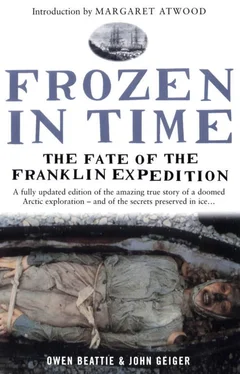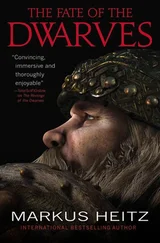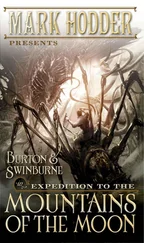Then there was Interim Franklin, the one who came into being once the first Franklin failed to return and people in England realized that something must have gone terribly wrong. This Franklin was neither dead nor alive, and the possibility that he might be either caused him to loom large in the minds of the British public. During this period he acquired the adjective “gallant,” as if he’d been engaged in a military exploit. Rewards were offered, search parties were sent out. Some of these men, too, did not return.
The next Franklin, one we might call Franklin Aloft, emerged after it became clear that Franklin and all of his men had died. Not only had they died, they had perished, and they had not just perished, they had perished miserably. But many Europeans had survived in the Arctic under equally dire conditions. Why had this particular group gone under, especially since the Terror and the Erebus had been the best-equipped ships of their age, offering the latest in technological advances?
A defeat of such magnitude called for denial of equal magnitude. Reports to the effect that several of Franklin’s men had eaten several others were vigorously squelched. Those bringing the reports—such as the intrepid John Rae, whose story was told in Ken McGoogan’s 2002 book, Fatal Passage —were lambasted in the press; and the Inuit who had seen the gruesome evidence were maligned as wicked savages. The effort to clear Franklin and all who sailed with him of any such charges was led by Jane, Lady Franklin, whose social status hung in the balance: the widow of a hero is one thing, the widow of a cannibal quite another. Due to Lady Jane’s lobbying efforts, Franklin, in absentia, swelled to blimp-like size. He was credited—dubiously—with the discovery of the Northwest Passage and given a plaque in Westminster Abbey and an epitaph by Tennyson.
After such inflation, reaction was sure to follow. For a time in the second half of the twentieth century we were given Halfwit Franklin, a cluck so dumb he could barely tie his own shoelaces. Franklin was a victim of bad weather (the ice that usually melted in summer had failed to do so, not in just one year, but in three), but in the Halfwit Franklin reading, this counted for little. The expedition was framed as a pure example of European hubris in the face of Nature: Sir John was yet another of those Nanoodles of the North who came to grief because they wouldn’t live by Native rules and follow Native advice—“Don’t go there” being, on such occasions, Advice #1.
But the law of reputations is like a bungee cord: you plunge down, you bounce up, though to diminishing depths and heights each time. In 1983, Sten Nadolny published The Discovery of Slowness, a novel that gave us a thoughtful Franklin, not exactly a hero but an unusual talent, and certainly no villain. Rehabilitation was on the way.
Then came Owen Beattie’s discoveries and the description of them in Frozen in Time. It was now clear that Franklin was no arrogant idiot. Instead he became a quintessentially twentieth-century victim: a victim of bad packaging. The tins of food aboard his ships had poisoned his men, weakening them and clouding their judgment. Tins were quite new in 1845, and these tins were sloppily sealed with lead, and the lead had leached into the food. But the symptoms of lead poisoning were not recognized at the time, being easily confused with those of scurvy. Franklin can hardly be blamed for negligence, and Beattie’s revelations constituted exoneration of a kind for Franklin.
There was exoneration of two other kinds, as well. By going where Franklin’s men had gone, Beattie’s team was able to experience the physical conditions faced by the surviving members of Franklin’s crews. Even in summer, King William Island is one of the most difficult and desolate places on earth. No one could have done what these men were attempting—an overland expedition to safety. Weakened and addled as they were, they didn’t have a hope. They can’t be blamed for not making it.
The third exoneration was perhaps—from the point of view of historical justice—the most important. After a painstaking, finger-numbing search, Beattie’s team found human bones with knife marks and skulls with no faces. John Rae and his Inuit witnesses, so unjustly attacked for having said that the last members of the Franklin crew had been practising cannibalism, had been right after all. A large part of the Franklin mystery had now been solved.
ANOTHER MYSTERY has since arisen: Why has Franklin become such a Canadian icon? As Geiger and Beattie report, Canadians weren’t much interested at first: Franklin was British and the North was far away, and Canadian audiences preferred oddities such as the well-known midget Tom Thumb. But over the decades, Franklin has been adopted by Canadians as one of their own. For example, there were the folksongs, such as the traditional and often-sung “Ballad of Sir John Franklin”—a song not much remembered in England—and Stan Rogers’ well-known “Northwest Passage.” Then there were the contributions of writers. Gwendolyn MacEwen’s radio drama Terror and Erebus was first broadcast in the early 1960s; the poet Al Purdy was fascinated by Franklin; the novelist and satirist Mordecai Richler considered him an icon ripe for iconoclasm, and, in his novel Solomon Gursky Was Here, added a stash of cross-dresser women’s clothing to the contents of Franklin’s ships. What accounts for such appropriation? Is it that we identify with well-meaning non-geniuses who get tragically messed up by bad weather and evil food suppliers? Perhaps. Or perhaps it’s because—as they say in china shops—if you break it, you own it. Canada’s North broke Franklin, a fact that appears to have conferred an ownership title of sorts.
It’s a pleasure to welcome Frozen in Time back to the bookshelves in this revised and enlarged edition. I hesitate to call it a groundbreaking book, as a pun might be suspected, but groundbreaking it has been. It has contributed greatly to our knowledge of a signal event in the history of northern journeying. It also stands as a tribute to the enduring pull of the story—a story that has passed through all the forms a story may take. The Franklin saga has been mystery, surmise, rumour, legend, heroic adventure and national iconography; and here, in Frozen in Time, it becomes a detective story, all the more gripping for being true.
Margaret Atwood
Ah, Franklin!
To follow you, one does not need geography.
At least not totally, but more of that
Instrumental knowledge the bones have,
Their limits, their measurings.
The eye creates the horizon,
The ear invents the wind,
The hand reaching out from a parka sleeve
By touch demands
that the touched thing be.
GWENDOLYN MACEWEN,
Terror and Erebus
Ah, for just one time,
I would take the Northwest Passage
To find the hand of Franklin
reaching for the Beaufort Sea
Tracing one warm line through a land
so wide and savage
And make a Northwest Passage to the sea.
STAN ROGERS, “Northwest Passage”
1
King William Island, 29 June 1981
King william island is one of the most desolate places in the world, a virtually featureless polar semidesert of limestone and mud interspersed with ice-water lakes. Located in the Canadian Arctic archipelago, separated from the north coast of the North American continent by Simpson Strait, the island is large—5,244.5 square miles (13,111 sq km)—but indistinct, rising to a maximum elevation of only 450 feet (137 metres). Yet the indifference of the landscape stands in stark contrast to the island’s dramatic history.
Читать дальше










